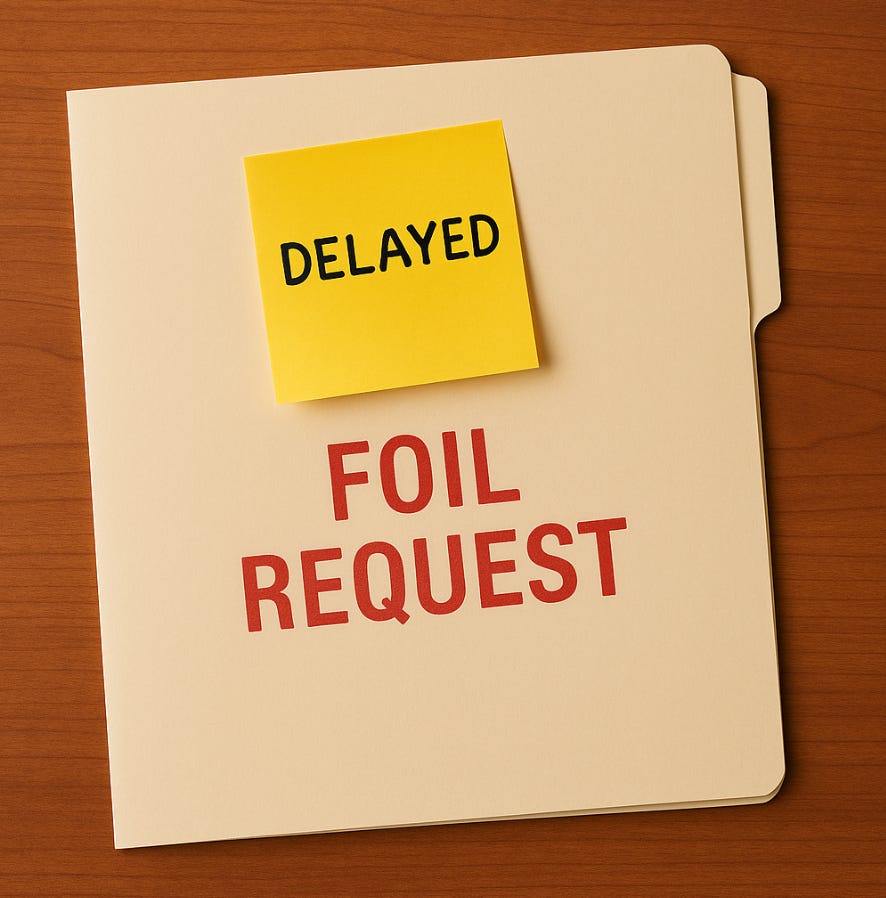FOIL'd No More!
New law sets deadlines for government agencies to fulfill open records requests—for the first time ever.
On February 2, I filed an open records request with the New York State Office of Temporary and Disability Assistance. I asked for data on how long it takes each county to process applications for SNAP and Temporary Assistance.1 This is basic, public information—and I know it exists because I’ve requested the same data for Monroe County several times before and received it within weeks.
But this time? I’m still waiting nearly five months later.
And here’s the problem: it’s completely legal for the state to drag its feet. Under New York’s Freedom of Information Law (FOIL), there is currently no statutory time limit for when an agency must actually provide the records. They just have to acknowledge the request and send the occasional vague update. That loophole allows agencies to delay for months—or even longer—without consequence.
I’ve filed hundreds of open records requests over the last two decades—first as a journalist, now as a legislator. It’s extremely common for governments to slow-walk FOILs, especially when the information is politically sensitive or inconvenient. In 2023, I filed a FOIL with Monroe County for documents related to the county executive’s security detail. After four months of delays, I submitted an appeal alleging a “constructive denial”—an official notice that the delay amounts to a de facto denial.2 That gave the county 10 days to respond. It worked, sort of. They sent over some records, but the response was limited. And if they hadn’t complied, my only remaining option would have been to sue.
That’s why I was thrilled to see the Legislature pass a long-overdue reform to FOIL this session. For the first time, there will be a legal clock on when state agencies must actually provide public records.
Here’s how it will work:
180 days for requests submitted before December 31, 2026
90 days for requests submitted in 2027
60 days for requests submitted beginning in 2028
There are limited exceptions—for example, if federal law prohibits disclosure, if records are physically inaccessible, or if the request is especially voluminous. But even then, the agency must:
Notify the requester and the Committee on Open Government in writing
Provide a detailed explanation signed by the agency commissioner
Give monthly updates until the request is fulfilled
These changes will bring long-overdue accountability to a system that has often served to shield dysfunction rather than expose it. I hope the governor signs this into law so it can take effect starting next year.
I wanted this data for this report. I decided to publish anyway, knowing it could be many more months before the state filled my request.
I usually advise people to wait six months before filing a constructive denial appeal. If the request is narrow, I think it’s okay to appeal within four months. That’s why the new law is fantastic, because we now have a definition for what is a reasonable time limit.





Thanks for bringing this to the forefront. It’s remarkable how little freedom or information is involved with FOIL. I will write in to our Senator and lend my voice. I will search for an email/phone call campaign.
Rachel, you know, as well as I that government will figure out a workaround, regardless of what the law says. Maybe not for basic information as you example, but anything that involves a legal case will be circumvented. Often times this involves law-enforcement or other government agency that doesn’t want to share certain information . The information is either denied outright or appears after the court appearance or final disposition is made, or long after that information would be useful. Unless, of course, you’re a government employee using it to defend yourself against something. Heaven forbid one of us serfs request that information to defend ourselves against the government.